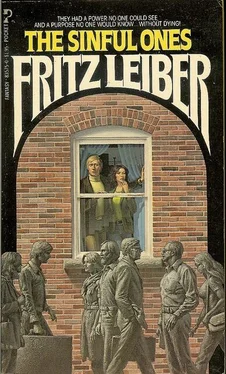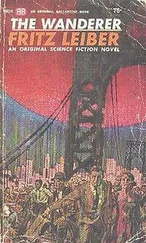With a great roar a cavalcade of newspaper trucks careened across the next corner, plunging as frantically as if the face of nations were at stake.
The feeling of active dread, that had first hit him on entering the business district, had increased. There was something that must not hear him, something that must not see him, something that under no circumstances must be allowed to know that it was heard or seen.
Easy enough to understand why a bunch of deserted skyscrapers should give a person a momentary shiver. But why should it give you that certainty of a gang bent on tracking you down? And why, in the name of sanity, should that feeling be tied up with such incongruous items as an advertisement for Wilson’s Hams, a glass panel, a black dog on a leash?
And somehow the number three. Three things? Three persons? Three what?
His feeling of near-memory was mounting toward a climax. He was certain that each hollow in the stone treads had received his foot before; that each naked vista of steel-ribbed and sinewed shafts had trapped his wandering gaze.
It had grown quite light while he’d been thinking. The stars had all gone. He could even make out, some blocks distant, the giant statue of Ceres atop the Board of Trade building. He recalled that she had no face. Being too high for features to be discerned except from an airplane or by telescope, a blank curved surface of stone did just as well.
Then, close, in fact across the street, he noticed three figures. He leaned forward sharply, watching.
For moment he though they might be statues.
There were really four figures, but the fourth was that of a large black animal—doglike yet somehow feline.
The three taller figures seemed to be surveying the sleeping city, somberly, speculatively.
The first was standing beside the dog with one arm extended straight forward towards its neck, as if holding it was the sheen of light, glistening hair, the flare of a wide-shouldered coat.
The second was a portly man.
The third was slenderer, taller, seemingly younger. His head looked small and neat, though not bald. And as he extended his arm to point at something far off, his cuff seemed empty.
Flashes of memory flickered wildly in Carr’s brain. He leaned forward a bit more and craned his neck, as if getting even an inch closer to the group might let him identify him.
It was still too dark for faces. Yet through he knew those three had faces and what the faces looked like, he found himself wondering if they, any more than the statue of Ceres, needed to wear faces now.
He leaned farther and farther forward.
He remembered everything.
Chapter Eleven
The Visible Woman
The knob of Carr’s bedroom door kept turning around and back. First a slow, creaking rotation, until the latch bolt was disengaged. Then a push, so that the door strained against the inside bolt. Then the knob, suddenly released, would spin back with a rattle. Then it would start all over again.
From where he lay, fully clothed except for shoes and coat, Carr watched the knob, peering along his leg and through the intricate brass bars that rose at the foot of the bed. He breathed as shallowly as he could. Although his neck and shoulders ached, he kept his head in the same awkward jerked-up position it had assumed when he first heard someone at the door. All his faculties were concentrated on avoiding any betraying sounds.
An infinitesimal breeze stirred the drawn shade. A big fly buzzed lazily in the muted sunlight, hovered along the ceiling, dipped to the mantle, floated noisily across the room, hit the shade with a loud plop, fell to the sill, crawled along it for a while, buzzed, and then started hovering along the ceiling again.
Carr could hear the throaty breathing of whoever was outside the door. Besides that sound there was a faint shuffling or scrabbling, as if a dog were trying to get in.
The doorknob kept on turning like a broken-down bit of machinery that refuses to gasp its last.
For a moment Carr thought the fly had lit on his forehead. It was just a trickle of sweat, but it was enough to make him jerk a little. The bedsprings creaked. His muscles tightened. His stiffened his aching, nearly trembling arms. The whole room seemed to become a wall-papered funnel narrowing down to the doorknob, which kept on turning and springing back just as before.
He could hear more than the breathing now. A querulous muttering as if whoever were outside was getting impatient.
The fly plopped against the shade, fell, and buzzed along the sill. A bit of laughter floated up from the street.
All the will power in the world could no longer have subdued the shaking in Carr’s arms. Again the bedsprings creaked, so loudly that whoever was outside must surely hear.
Yet the rhythm of the knob did not change, though the mutterings grew a trifle louder. Carr strained his ears, but could not make out the words.
The shade swayed. The fly started on its trip across the ceiling. He shifted his weight from arms to buttocks, slid one foot to the floor. The springs creaked, but no worse than before. In a moment he was crouching beside the bed. The mutterings were still unintelligible. He took a cautious step toward the door.
The knob stopped moving. There was a scrape of metal on wood and the swish of water. Then footsteps plodding away from the door.
Carr hesitated. Then he quickly tiptoed to the door, eased open the bolt, paused again, opened the door a slit and peered out.
The cleaning woman was walking away, pail in one hand; mop, broom, duster, and dustpan in the other. Straggly plumes of hair stuck up from the rag wound around her hair. A damp, dirty blue apron was tied in a hard knot behind her waist. The heels of her shoes ran off at the sides.
Carr opened the door farther. He wet his lips. “Hello,” he said huskily.
The cleaning woman kept walking away.
He stepped into the hall. “Hello,” he called, getting control of his voice. Then, louder, “Hello!”
Not by a moment’s hesitation, not by the slightest alteration in her trudging gait, did the cleaning woman indicate that she heard.
“Hello!” Carr shouted.
The cleaning woman disappeared at an even pace down the stairs. Carr gazed after her. But his mind was listening to the drone of lone-forgotten phrases from a college psychology class:
To explain human behavior, it need not be assumed that consciousness exists. After all, we can never penetrate to the inner life of other individuals. We can never prove that such an inner life exists. But we need not. All the actions of human beings can be adequately accounted for on the assumption that human beings are unconscious mechanisms.
He edged blinding back into his rooms, bolted the door behind him, slumped against it.
At least, he told himself, the things at his door had not been what he had most feared.
But it had been almost worse.
Why, he asked himself, had he bothered to shout? Why had he sought last, unnecessary confirmation?
He already knew, had known ever since he had recovered his memory and fled from the streets.
Knew what he had known, known and rejected, at least four times before: when he had been ignored by the dumpy man and the doctor at General Employment, when he had watched Marcia in her bedroom, when he had spied on Jane’s parents in their apartment, when he had run away from the Pendleton party.
But then he had known it only for fleeting moments.
This time it had gripped his mind for hours.
It was insane, incredible.
But it was true.
Nothing else could explain his experiences.
Jane knew, the small dark man knew, these other three knew.
And now he knew.
The universe was a machine. The people in it, save for a very few, were mindless mechanisms, clockwork things of flesh and bone. So long as you made the proper clockwork motions, they seemed to react intelligently. But when you stopped, they went on just the same. When you quite being part of the clockworks, they ignored you.
Читать дальше









